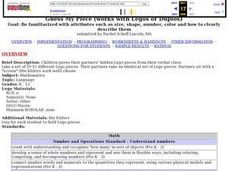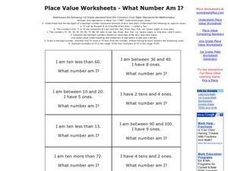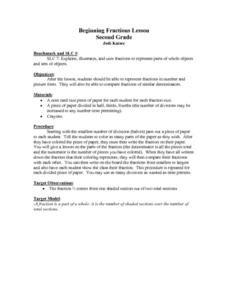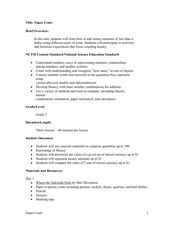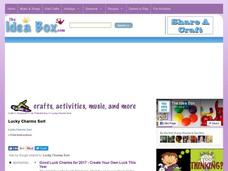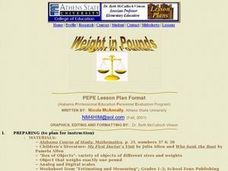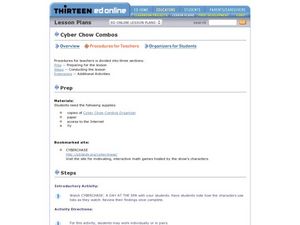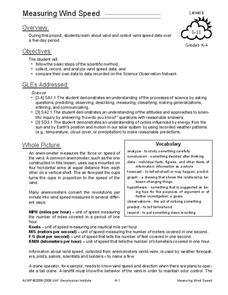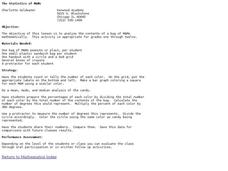Curated OER
Guess My Piece -working with Legos
Students participate in guessing their partners' hidden Lego pieces from their verbal clues. They work in partners to accomplish their goals. They are meeting a variety of math standards by completing this lesson.
Curated OER
Which Number is Greater
In this which is greater worksheet, students circle greatest numbers in sets. A website reference for additional resources is given.
Curated OER
Counting in Ten's and Two's
In this counting worksheet, students complete activities, first counting in ten's, then two's. Students give numbers that are 10 more or less, 2 more or less, circle and write numbers that = 10 and solve number problems.
Worksheets Plus
Place Value Worksheets - What Number Am I?
Practice place value with this resource. The 12 questions consist of riddles. For example, "I have 4 tens and 2 ones. What number am I?" This is a creative approach to thinking about double-digit numbers. Answers are available so you can...
Curated OER
Beginning Fractions Lesson
Second graders practice representing fractions in number and picture form. They compare fractions with similiar denominators. They use a piece of paper to visualize the fraction.
Curated OER
Party, Party, Party
Second graders conduct investigations with counting, comparing, organizing, analyzing, displaying and interpreting data. They pose questions for investigation and collect the data. Students display the data in tally charts, uniform...
Curated OER
Number Books
Young scholars construct a book to illustrate number concepts. They write their numbers on a sheet of paper. Students in grade 1 discuss counting to 100 by different numbers. Pupils in grades (2-4) write basic addition or subtraction...
Curated OER
Too Many Tens
Students practice grouping in different ways by putting numbers up to 1,000 in the correct place value. In this place value lesson plan, students estimate items in a jar and then count them out by grouping them by 10s.
Curated OER
Estimation and Computation
Second graders practice their estimation skills using blocks. In this math lesson, 2nd graders explain how estimating makes addition easier. They complete a worksheet after the lesson to reinforce new learning.
Curated OER
Collecting Data and Graphing
Students practice collecting and graphing data using interlocking cubes. In this graphing instructional activity, partners count cubes and graph them. They also use a meter stick to measure arm span and height then compare the results...
Curated OER
Super Cents
Second graders study money amounts less than a dollar. In this math lesson, 2nd graders practice counting coins. Students read various stories and discuss how money was used in the stories.
Curated OER
Trains
Students compare the lengths of the train through calculation. This calculation can be done by knowing the values of the rods. Students use problem solving to get the answer to the problem before them.
Pennsylvania Department of Education
Adding and Subtracting Three-Digit Numbers by Jumping
Second graders use data to graph information and draw conclusions. In this lesson on data analysis, 2nd graders practice gathering, sorting, comparing, and graphing data. Students differentiate data that can and cannot change over time.
Curated OER
Lucky Charms Sort
Students make a bar graph. In this sorting and counting lesson, students use the Lucky Charms cereal to sort the marshmallows into separte cups, count how many marshmallows are in each cup and make a bar graph to compare the numbers.
Curated OER
Size, Shape, and Color
Young scholars demonstrate that they can identify simple geometric shapes and compare them by color and size accordingly: by the main shapes, sizes, and color. They comprehend the names of the sizes, shapes and colors in the target...
Curated OER
Weights in Pounds
Second graders define "pound," estimate and compare weights, and classify objects as weighing more or less than a pound.
Curated OER
How Much Is On The Floor?
Students estimate the number of items in a group. In this estimation lesson, students are presented with random objects to clean up. Students estimate how many items are present and then compare the actual number of items to their...
Curated OER
Who's In The Fact Family?
Students study related addition and subtraction facts. In this math lesson, students use related addition and subtraction to solve problems. Students use manipulatives to explore fact families.
Curated OER
Cyberchase
Young scholars participate in math games to learn to count combinations. In this counting combinations instructional activity, students complete the 'Cyber Chow Combos Organizer' to practice counting combinations. Young scholars then...
Curated OER
Measuring Wind Speed
Students study wind speed and collect wind speed data. In this wind speed lesson, students visit a website to learn about the local wind speed forecast for their week. Students discuss wind and wind speed. Students collect wind speed...
Curated OER
The Statistics of M&Ms
Students explore the topic of statistics with M and Ms. In this math lesson plan, students use candy pieces to sort and gather information needed to create a bar graph. This instructional activity can be adapted to accommodate students...
Curated OER
Greater Than - Less Than
In this number comparisons worksheet, learners compare the illustrated object numbers by inserting either the greater than or less than sign between the numbers. Students then write the comparison relationship of the numbers in the last...
Pennsylvania Department of Education
Alike and Different
Students compare and contrast objects and are introduced to a Venn Diagram. In this alike and different lesson, students make observations regarding properties of objects. Students classify object and build ideas about variables....
Fuel the Brain
Greatest and Least Word Problems
Your young learners are going to have to prove the answer for the greatest to least word problem. Using a chart for the second problem, your learners will have to use their mathematical terms to explain the solution.


